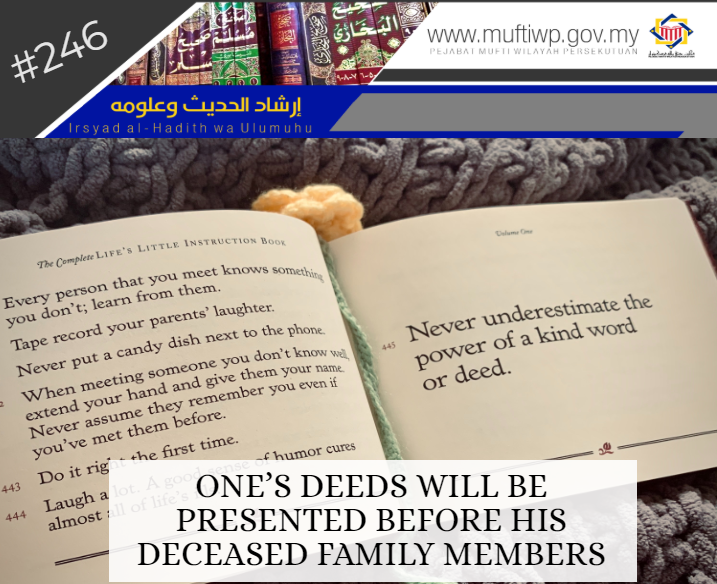Question:
What is the status of the following hadith?
إِنَّ أَعْمَالَكُمْ تُعْرَضُ عَلَى أَقَارِبِكُمْ وَعَشَايِرِكُمْ مِنَ الْأَمْوَاتِ فَإِنْ كَانَ خَيْرًا اسْتَبْشَرُوا وَإِنْ كَانَ غَيْرَ ذَلِكَ قَالُوا: اللَّهُمَّ أَلْهِمْهُمْ أَنْ يَعْمَلُوا بِطَاعَتِكَ
“Indeed, your deeds will be presented before your deceased family members. If it is good (the deed), then they (the family members) will bring good news. If it is bad, they will say, ‘O Allah, inspire them to be in Your path of obedience’”
Answer:
Alhamdulillah, praise and thanks to Allah for the countless blessings He has blessed us all with. Blessings and salutations to the Prophet Muhammad PBUH, his wives, his family, companions and all those that follow his teachings to the day of judgement.
Based on the above question, this matter is related to the matters of the unseen. Believing in the unseen is one of the attributes of the God-fearing people in accordance with the saying of Allah SWT:
لَّذِينَ يُؤْمِنُونَ بِالْغَيْبِ وَيُقِيمُونَ الصَّلَاةَ وَمِمَّا رَزَقْنَاهُمْ يُنفِقُونَ
Who believe in the unseen, establish prayer, and spend out of what We have provided for them,
Surah al-Baqarah (3)
To answer the above question, we should first determine the origin of the hadith or saying before stating it is from the Prophet PBUH. It was narrated by one of the Companions named Jabir bin Abdillah RA and it is also included in Musnad Abi Dawud al-Thoyalisi:
- It is narrated that Jabir bin Adillah RA said that the Prophet PBUH said:
إِنَّ أَعْمَالَكُمْ تُعْرَضُ عَلَى أَقَارِبِكُمْ وَعَشَايِرِكُمْ مِنَ الْأَمْوَاتِ فَإِنْ كَانَ خَيْرًا اسْتَبْشَرُوا وَإِنْ كَانَ غَيْرَ ذَلِكَ قَالُوا: اللَّهُمَّ أَلْهِمْهُمْ أَنْ يَعْمَلُوا بِطَاعَتِكَ
“Indeed, your deeds will be presented before your deceased family members. If it is good (the deed), then they (the family members) will bring good news. Conversely, they will say, ‘O Allah, inspire them to be on Your path of obedience’” [Narrated by Abu Dawud al-Thoyalisi]
In addition, there is a saying which is almost similar in terms of its mafhum (meaning) with the above, but the person narrating it is different which is Anas bin Malik RA. This narration of Anas bin Malik RA has been narrated by Imam Ahmad bin Hanbal in his musnad.
- It is narrated from Anas bin Malik RA that the Prophet PBUH said:
إِنَّ أَعْمَالَكُمْ تُعْرَضُ عَلَى أَقَارِبِكُمْ وَعَشَايِرِكُمْ مِنَ الْأَمْوَاتِ فَإِنْ كَانَ خَيْرًا اسْتَبْشَرُوا وَإِنْ كَانَ غَيْرَ ذَلِكَ قَالُوا: اللَّهُمَّ لَا تُمِتْهُمْ حَتَّى تَهْدِيَهُمْ كَمَا هَدَيْتِنَا
“Indeed, your deeds will be presented before your deceased family members. If it is good (the deed), then they (the family members) will bring good news. If it is bad, they will say, ‘O Allah, do not make them die before You give them guidance like You gave us.” [Musnad Ahmad (12683)]
Imam Ibn Hajar al-Haithami said that in this narration from Imam Ahmad, there is a narrator who is not known. [See: Majma’ al-Zawaid, 328-329/2]. In addition, Sheikh Shu’aib al-Arna’outh evaluated this hadith as dhaif (weak) as there are narrators who are not known like Sufyan and Anas bin Malik. Imam Ahmad is tafarrud (alone) in narrating this hadith. [See: Musnad Ahmad, 114/20]
Besides, there is a hadith or a saying which supports the first narration, but it is very dhaif (weak), which is narrated by Abi Ayub al-Ansari RA, where the Prophet PBUH said:
وَإِنَّ أَعْمَالَكُمْ تُعْرَضُ عَلَى أَقَارِبِكُمْ وَعَشَائِرِكُمْ مِنْ أَهْلِ الآخِرَةِ ، فَإِنْ كَانَ خَيْرًا فَرِحُوا وَاسْتَبْشَرُوا
"And indeed, your deeds will be presented to your deceased family members and relatives who are among the people of the akhirah. If it is good (the deed), they will be happy and deliver the good news to you." [Narrated by al-Thabarani in al-Mu’jam al-Kabir (3887)]
According to Imam al-Qurtubi, Wahab ibn Munabbih once said: “Indeed, for Allah SWT, there is a place in the seventh level of heaven called “لَهَاكُ البَيْضَاء”. There reside the souls of the believers when one of them passed away among the people of dunya. Those souls will meet one another and they will ask about their matters just like when two people who haven’t meet each other for a long time finally meeting again. This is mentioned by Abu Nu’aim Rahimahullah”. [See: al-Tazkirah fi Ahwal al-Mawta wa Umur al-Akhirah, 53]
Closing
The conclusion from the above discussion is the sayings which explain on the matter are dhaif (weak) and some scholars even lift its status to hasan li ghairihi through supports from other narrations although all of them is dhaif. However, these are among the matters of the unseen, so, for such matters, we cannot only depend on our logic. In fact, this should only be considered through textual context because only Allah SWT knows the unseen. May Allah SWT give us understanding in the religion. Ameen.
Wallahua’lam.


